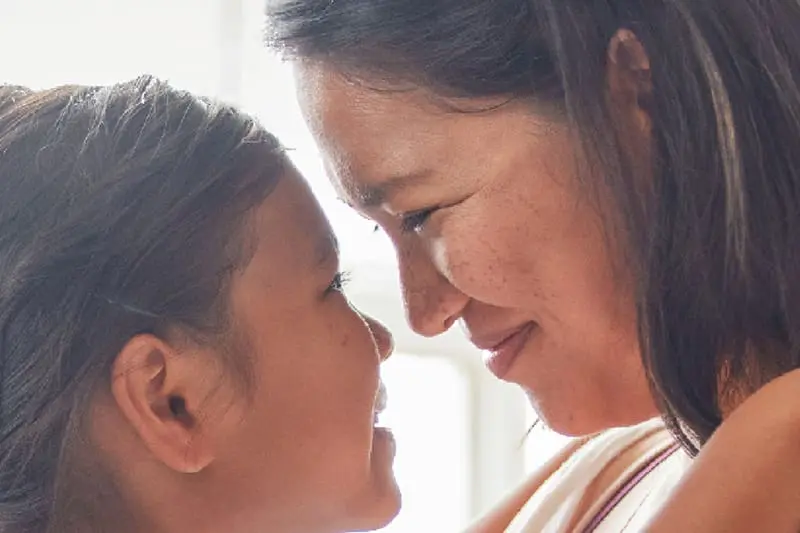My mother sits in a green vinyl chair next to a blue-and-white faux marble counter scattered with jewelry and glass bottles. At the other end is a shell-shaped sink, the kind a mermaid would have. The air is steamy and sweet, thick with the scent of Jean Naté After Bath Splash, drugstore lotions, and powders. I sit on a little stool at her feet, my head sideways in her lap. With careful, callused fingers she takes the silver pantutule and swirls it around the outer edges of my ear, then works her way in deep, scooping out my soft, crumbly white ear wax. She wipes the wax on a square of toilet paper so I can study it afterward—she knows I love to look at it, sometimes smell it, roll it in my fingers. When she is done with my left ear, I turn and face her stomach. I close my eyes and feel this soft part of her body rise and fall and brush against my face with each breath as she cleans my right ear. There’s no distance between us; I inhale her scent, am one with her heat. Even today, I can return to this feeling in an instant.
The ear spoon is a flimsy thing, made of cheap aluminum. In less caring hands, it could cut the delicate skin lining an ear canal or puncture an eardrum. My mother wielded it expertly, tenderly excavating my body’s waste. Cleaning my ears right after a bath made it easier—body damp and relaxed, ear wax softened. But I preferred having it done when everything was dry—I liked feeling my mother’s effort, her digging and the resistance, the careful vigilance required.
“For the Vietnamese, a lot of love is articulated through service,” says the poet Ocean Vuong in an interview I read. “We don’t say, I love you. We cook, we massage, we cao gió, we scratch each other’s backs.” A surge of recognition runs through me.
Sometimes, as a weekend treat, our family had champorado with tuyo for breakfast. I whined about having to separate the fish from the tinik that sometimes stuck in my throat and made me gag. My mom painstakingly pulled the meat from the fine bones to make a pile of salty fish for me to mix into the dark porridge.
My mother certainly told my brothers and me that she loved us, but always in English, not her native language. When she immigrated to the United States, she became fluent in English and much of American culture. But I sense that she might still be more comfortable giving and receiving love in demonstrative ways. Like so many immigrants, she adapted but can never abandon what was instilled in her body.
For much of my life, I thought words were the most important form of expression, but I don’t think that way now. The body conveys love so much more eloquently. Hearing “I love you” is nothing compared to feeling it, your body absorbing the message from another. Before we learn verbal language, we communicate through our bodies. The only way a young child can comprehend love is physically.

Having a body is generally treated as an inconvenience, especially a body that has constant, evolving needs. The racism, colorism, homophobia, transphobia, sexism, and ableism that define American culture insist, in both small and big ways, that those of us who differ from the perceived norm might be better off without our bodies. Having our basic physical needs met—the foundation for being able to freely pursue what we please—is a human right. It’s not a privilege bestowed on us through working or proving our deservedness; we are born deserving.
I reject the American idea of “earning a living.” I am alive and I don’t need to do anything to earn my existence. We don’t have to prove that we are worthy of comfort, ease, pleasure, or satisfaction. I don’t need a job to contribute something to my community—I just need to be me. Mothering shows children that there is nothing wrong with having a body and having needs. More important, it establishes the expectation that having those needs met is essential, a minimum guarantee in this life. Audre Lorde terms this vital, physical energy the erotic. “We tend to think of the erotic as an easy, tantalizing sexual arousal,” she writes. “I speak of the erotic as the deepest life force, a force which moves us toward living in a fundamental way.”
Mothering is sensual—endemic to the body and bringing both profound joy and fulfillment. It cultivates and nurtures a child’s life force and essence. It is labor that can bestow a primal sense of satisfaction to children and caregivers alike.

For the early years of a child’s life, the geography of mothering, more than the house or playground, is the body. No one knows our bodies, or the bodies that we wipe and caress every day, better than ourselves. During pregnancy and throughout the early years of mothering, we are actively discouraged from trusting our instincts by guidebooks and so-called experts.
“As women,” Lorde writes, “we have come to distrust that power which rises from our deepest and nonrational knowledge.” This keeps us uncertain, small, and afraid. While parenting books mostly leave me agitated, I can’t shake something written in 1946 by Dr. Benjamin Spock, a clarion call that cuts through so much noise: “Trust yourself. You know more than you think you do.”
Having children has taught me that love is an action verb. And one that can only be performed with our hands and arms and brain and torsos, however imperfect or tired or ungovernable they are. Mothering is acts of service and attention to the body. Drool wiping, hand washing, nose blowing, food spooning, hair brushing, bathing, picking up, pinning down to put clothes on, changing diapers. You move, but you also have to be still. To let them lie on you, to stroke their hair, to study and memorize them.
You simply can’t convey with words your dedication to a child. (Arguably, you can’t do it with just words with adults either—action is best, but you have a better chance of conveying it in a way that can be intellectually comprehended.) You have to show children with physical attention and affection. And you have to show them over and over and over again.

It is draining, tedious, and repetitive, but the work keeps us close to one another, returns us, again and again, to our own corporeal forms. Physical labor exhausts me, but it makes me more tender. More empathetic, more sensate, more porous. In touch with all the emotions.
When my toddler refuses to get dressed or wear anything other than a star dress that is in the washing machine, things can go south quickly. I point out that she has so many clothes, she says she hates them all. I threaten to throw everything away, she dares me to do it. I yell, she yells, I yell and leave the room and she cries, or I just yell and stay put and we stare at each other in a huffy standoff. But sometimes I catch myself before the yelling cycle kicks in. Sometimes I remember I can do something else. Sometimes I take a deep breath. I sit on the floor. I get close, I talk softly. I slow it all down and take another breath, feel my nervous system begin to calm down. Hers does too. I offer a hug, we embrace, we start over. I only succeed at doing this maybe half the time. But when I take a minute, step away, be in the breath, my instinct tells me to stick with it, to stay in it with her, to show her that no matter how angry I am, no matter what she does, no matter how far we push ourselves away from each other, my love for her will always be close, a constant.
The physical closeness that my mother missed out on receiving from her own mother was given freely and generously to me. Even though she worked full-time and couldn’t be with me every time I needed her, I still remember the care, the intimacy, the tending. To this day my body knows the feeling of being held. We give the people we mother our bodies, and what they will recall is our presence and heat, the animal closeness. Before and after words come, this is what we need—this connectedness—the last thing we find ourselves groping for at night when quiet descends and we are alone with our soft selves in need of comfort.
From the book Essential Labor by Angela Garbes. Copyright © 2022 by Angela Garbes. Published by Harper Wave, an imprint of HarperCollins Publishers. Reprinted by permission.
Angela Garbes is the author of Like a Mother, an NPR Best Book of the Year and a finalist for the Washington State Book Award in nonfiction. Her work has appeared in the New York Times, The Cut, and New York, and has been featured on NPR’s Fresh Air.
PHOTO © ISTOCK/PEOPLEIMAGES












